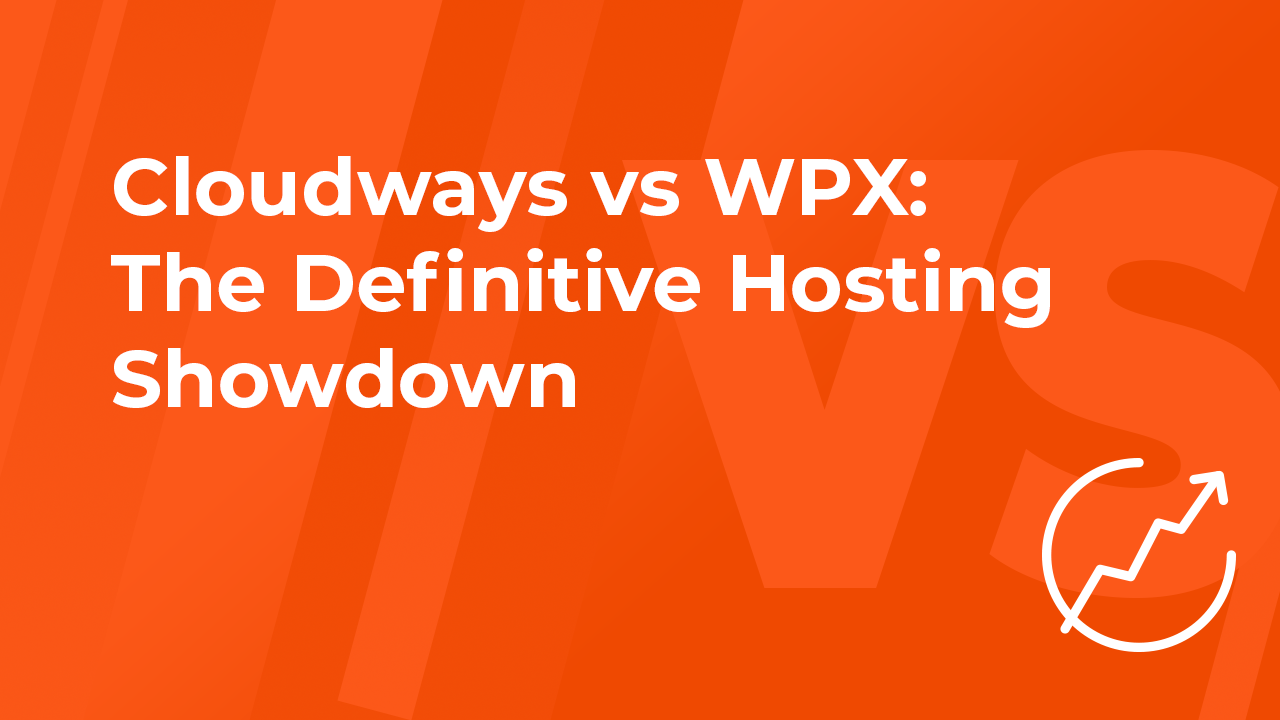If you ever needed WordPress hosting, you probably wondered which is better: Cloudways or WPX?
Both services are popular web hosting providers, they both have advantages, and they both had slip ups in the past. So how can you know which of them will be more reliable, safer, faster, and less of a headache?
Hosting in a Nutshell
Both Cloudways and WPX hosting are popular options if you need managed WordPress hosting. The main difference is in the core offer.
Cloudways offers cloud hosting, which is usually supposed to be faster than shared hosting (but not in the case of Cloudways vs WPX hosting, as you’ll see in the performance section). However, it doesn’t do much to help new users make the most out of their WordPress hosting.
WPX is much more user-friendly. In fact, it’s the only one out of the two that can be accurately called “managed WordPress hosting”, more on that below. It also offers more features, including a built-in free CDN, malware removal, email servers, prompt migration, and world-class support. WPX hosting is more expensive upfront, but it’s cheaper when you take into account all the add-ons you’ll need as a Cloudways customer.
To justify our take on Cloudways vs WPX hosting, we’ll talk about every category that the end user cares about – ease of use, security, performance, support, pricing. This way, we hope to provide an accurate comparison between the two hosting companies, and which is best for you.
Core Difference in Offer
The first big difference between WPX and Cloudways is the actual service you get. While Cloudways claims to be “managed hosting” that’s not entirely accurate. Rather, Cloudways is a control panel to manage a server. It is a software platform that connects you, the site owner, with different Cloud hosting platforms, namely, Digital Ocean, Linode, Vultr, Amazon Web Services and Google Cloud.
WPX, on the other hand, is actual managed WordPress hosting. You won’t need advanced sys admin skills to use WPX web hosting. Plus, it doesn’t rely on third-party services like Digital Ocean, Linode or Vultr. WPX runs on its own servers, with its own CDN, hardware, and email services. With Cloudways, you might even have to pay extra for some of these benefits.
This difference in service makes WPX a better choice. It’s easier to use, safer, and it even has a better price when you account for all the add-ons you’ll need to get to supplement Cloudways features. And we’re not the only ones saying this:

Ease of Use
Cloudways has a complicated dashboard. You’ll need sys admin skills if you want to properly set everything up, and take care of the day-to-day management of your site. Here’s a screenshot of Cloudways’ interface:

If you don’t have a tech-savvy person on board, you’ll need to learn:
- Apache/Nginx
- Memcache
- MySQL
- Varnish
And potentially more.
We want to be reasonable here, so we’ll admit: you need less technical skills to use Cloudways than you would to use Linode, or Vultr directly. But not a lot less. And if you go through the trouble of learning what staging, or SFTP access is, you might as well learn the ropes and use simple web hosting services directly.
If you don’t want to bother with all that, the choice is simple. WPX hosting helps you create and manage a site without requiring too much technical knowledge, or effort on your part. Here’s an example of WPX’s interface:

Not to mention, if you ever have trouble finding a feature, the support team can guide you, or even solve the issue for you.
Security and Malware Removal
Security and malware removal is an increasingly important topic. Cybercrime has been on the rise since 2008, and a steep rise since 2020. With data breaches costing an average of $4.35 million in 2022, it’s now as important as ever to take security seriously. Hosting companies should recognize this and help their customers secure their online business.
So how does Cloudways protect you? By default, it doesn’t do much. It just has a firewall at the server level, for server security. Beyond that, you’re on your own. Cloudways doesn’t even help you clean malware from your site.
If you need any malware removal services, you’ll need to pay extra for Sucuri. It’s a decent plugin. Sucuri can scan your site, fix an issue, provide ongoing protection, and even improve performance. But it’s not included in your Cloudways subscription. It will cost you an extra $200 per year.

Meanwhile WPX customers get advanced cybersecurity at no extra charge. This includes daily scans, malware cleaning, Hybrid DDoS protection, Brute Force protection, Web Application Firewall (WAF) and daily backups. Everything Sucuri does, and more, all for free.
And if that isn’t enough, WPX also has a dedicated team of security specialists, ready to assist you if your site is in danger, or infected. Cloudways vs WPX hosting is a pretty short debate when you take safety into account.
Performance and Speed
WPX also gets far ahead of Cloudways in terms of performance and speed. To prove this, we would just have to show you screenshots of independent performance tests.
For example, you can check out WP Hosting Benchmarks’ 2022 in-depth analysis of the most popular managed WordPress hosting providers. WPX outperformed Cloudways in every single test.

WPX hosting had the fastest load time, the fastest average response in WPT, and the fastest single location score in 10 out of 12 locales. Cloudways trailed at the bottom of most of their tests. If you want your WordPress site to run smoothly, WPX hosting is definitively the best choice.
And this isn’t something new. WPX hosting has consistently done better than Cloudways in these tests for years.

Top Tier WordPress Hosting is awarded to companies who maintain 99.9% uptime throughout the entire testing and show little to no performance degradation during load testing, primarily focused on error rate and consistent response times. Error rates above 0.1% and response times above 1000ms* will keep a company away from achieving Top Tier marks.
But wait, are’t you supposed to get dedicated VPS resources with Cloudways? How come it’s not performing better? The dedicated VPS resources of Cloudways are a bit misleading. Let’s see why.
The myth of dedicated VPS RAM
The way Cloudways advertises their VPS RAM resources can be a bit misleading. When you see 8 GB of VPS RAM from Cloudways, and 256 MB of RAM from WPX, you might think you’ll get better performance out of the 8 GB. But that’s not really the case.
The advertised RAM on VPS web hosting offers is usually shared between the web server (Apache/Nginx/Litespeed), the database server (MySQL/MariaDB), PHP processes for each website, DNS, mail, FTP and any other system usage. After you crunch those numbers, you get a few MB per process. Plus, VPS web hosting offers don’t give you access to an entire RAM card, just some dedicated resources.
Here’s another thing we’d like to point out: good performance isn’t just about the tech. If you want a good Pagespeed Insights score, you’ll need to optimize your site.
And so we come back to Cloudways’ complicated control panel. If you don’t know your way around a server, you might find it hard to optimize your site properly. And the hosting company doesn’t do much to help you with this. So you’ll have to pay more for a Cloudways team to help you optimize the site.
Meanwhile WPX offers 256 MB per PHP process, with 3 PHP processes per website.
Plus, WPX’s team of optimization experts will take care of everything for you. The first site optimization is covered by your normal WPX subscription, so you know you’re getting good performance. Cloudways vs WPX hosting is not a complicated dilemma if you need fast WordPress hosting.
All of this is probably why Digital Ocean, Vultr, Linode, and all the other Cloudways servers have abysmal scores on TrustPilot, all while WPX sits at a near perfect 5/5:
The performance will be pretty much the same, regardless of your preferred cloud server provider.

The Content Delivery Network
A Content Delivery Network (CDN) is very important to your site’s performance. The CDN is a network of geographically distributed servers and data centers that help load your site faster. And its impact on site performance cannot be overstated. Good managed cloud hosting should help you with a CDN.
If you want a CDN to go along with your Cloudways hosting, you can use Cloudflare. Admittedly, Cloudflare is a pretty good CDN. They help optimize your site performance, and enhance your security. They even have a free version. But as a Cloudways user, you only have access to Cloudflare Enterprise, which will cost you at least $4.99 per month.
WPX hosting has its own custom-built CDN. It’s included in all WPX plans, and it’s part of the WPX hosting infrastructure. This means that you won’t have any problems when a new update rolls around and incompatibilities pop up. That’s always a risk when relying on as many third party services as Cloudways does.
Customer Support and Onboarding
WPX has much better customer support than Cloudways. Their agents will go out of their way to fix issues for you, not just paste links to general support articles. That’s the reason WPX has a 4.9/5 score on TrustPilot.

WPX also has a dedicated support team of experts that will remove malware from your site, and/or optimize its performance for you. If you want any useful support from Cloudways, you’ll need to pay as much as $500/month, or $100 per issue that needs solving.
And that’s without mentioning migration. If you want to switch from a different provider to WPX, you’ll get free migration from any platform in less than 24 hours. Cloudways only offers some help in the form of a WordPress plugin, but it’s not as swift as WPX. You’ll need to wait as much as 48 hours just to hear back from them.
Cloudways customer support is notoriously bad. It’s one of the few pet peeves the biggest fans of Cloudways have with the service. If you want good hosting services and agents that care about your site, Cloudways vs WPX hosting has a pretty simple answer.
Pricing
Cloudways has a complex pricing scheme. How much you pay will depend on what hosting server you want to use, and what third-party services you’ll need on top of your subscription.
Their cheapest plan is Digital Ocean, which will cost you $14/month for 1GB RAM, 1 core processor, 25 GB of storage, and 1TB of bandwidth. But Digital Ocean can be as expensive as $99/month for more resources. AWS servers can be as much as $285.21/month.

WPX costs at least $20.83/month for 5 websites, 200 GB bandwidth, 1 GB RAM per website, 3 PHP workers per site, and 1 CPU core. So WPX is more expensive than Cloudways, but it’s actually cheaper when you account for Cloudways hidden cost.

Let’s run the numbers for how much you’ll pay on Cloudways if you want to get all the features of WPX. For starters, you’ll need a CDN. Cloudflare Enterprise is $4.99/month, so you’re already paying $18.99/month to ensure a smooth performance for all of your visitors. WPX hosting takes care of it at no extra charge.
Next, you’ll need a security suite to protect your site and WordPress installation from malware. Sucuri is $199/year, which comes down to $16.58 per month. That’s a total of $35.57, just to come close to what you get for $20.83 from WPX. But you’d still miss qualitative support, free migration in under 24 hours, email hosting, and an easy-to-use main dashboard.
WPX hosting is more expensive upfront. But it’s cheaper and better when you account for everything the two hosting companies offer.
Which Tool Should You Use?
The only reason to pick Cloudways over WPX is if you want a lower upfront cost. But know that you’re not getting something cheaper. When you account for everything you need to run your site smoothly, WPX has a better price.
Other than that, there’s no reason to choose Cloudways. WPX consistently outperforms Cloudways in tests, it’s easier to use, and safer, and it doesn’t rely on any third-party apps to function properly. Everything is built in-house, and running smoothly. In our book. Cloudways vs WPX hosting is a pretty simple choice.




